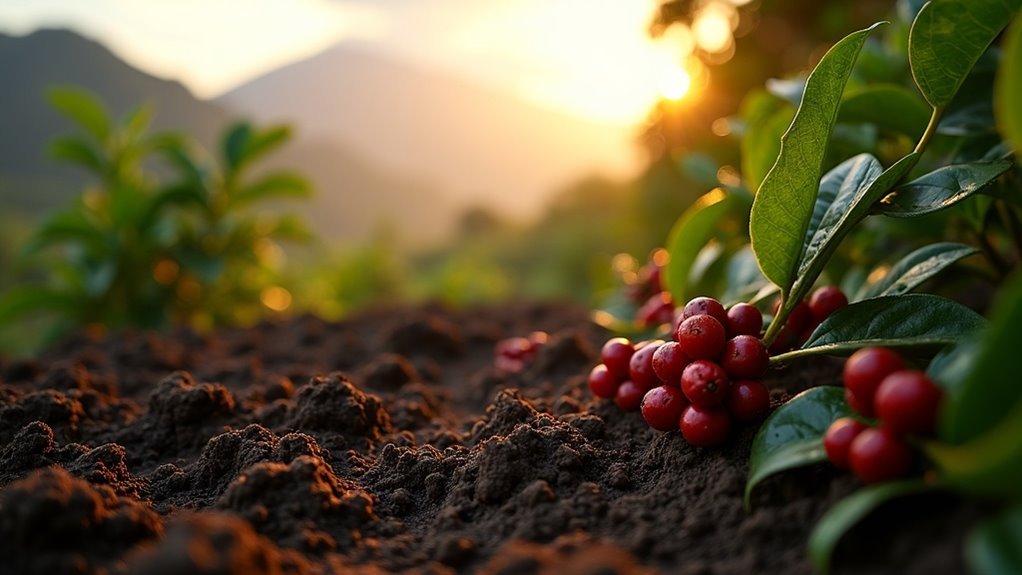Volcanic soil coffee is cultivated in Andisols, which are nutrient-rich soils formed from volcanic ash. These unique soils provide essential minerals such as potassium and magnesium, enhancing the flavor complexity and promoting the healthy growth of coffee plants. Coffee grown in volcanic regions typically presents a smooth and balanced taste, attributed to the distinctive mineral composition and optimal growing conditions found at higher altitudes. While the advantages of volcanic soil coffee are remarkable, there are also potential risks involved. There’s a wealth of information to explore regarding how these factors contribute to the coffee experience you savor.
Key Takeaways
- Volcanic soil, also known as Andisols, is rich in minerals and is essential for cultivating high-quality coffee due to its excellent drainage and nutrient density.
- The distinctive mineral composition found in volcanic soil enhances the flavor profile of coffee, resulting in smooth acidity, sweetness, and complexity.
- Coffee that is grown in volcanic soil flourishes at high altitudes, where cooler temperatures slow down growth, leading to denser and more flavorful beans.
- Although volcanic soil significantly improves coffee quality, the threat of eruptions can lead to crop destruction and economic instability for coffee farmers in these regions.
- For coffee farmers living near volcanoes, community resilience and emergency preparedness are vital to mitigate risks and ensure a swift recovery following eruptions.
Understanding Volcanic Soil and Its Characteristics
Volcanic soil, often referred to as Andisols, plays a crucial role in coffee cultivation due to its unique characteristics.
These soils are celebrated for their rich composition of minerals and nutrients, such as potassium, magnesium, and phosphorus, which are essential for robust coffee plant growth. The light, fluffy texture of volcanic soils promotes excellent drainage, preventing issues like root rot that can affect coffee plants.
With a high organic matter content, volcanic soils create a nutrient-dense environment ideal for coffee cultivation, while their porous structure supports deep root development, which is significant for stability and nutrient uptake.
Additionally, regular deposits of volcanic material enhance soil fertility, contributing to the distinctive flavor profiles of coffee grown in these regions.
The Nutrient Profile of Andisols
When you explore the nutrient profile of Andisols, you’ll discover a remarkable blend of organic matter and essential minerals that make these soils a powerhouse for coffee cultivation.
These nutrient-rich volcanic soils boast high levels of potassium, magnesium, calcium, phosphorus, and iron, all fundamental for thriving coffee plants.
Nutrient-rich volcanic soils are packed with potassium, magnesium, calcium, phosphorus, and iron, essential for thriving coffee plants.
Their porous structure guarantees excellent drainage, preventing overwatering and promoting robust root development, which is crucial for producing high-quality coffee beans.
Volcanic eruptions enrich Andisols with tephra, enhancing fertility over time.
This unique mineral composition not only supports healthy coffee plant growth but also plays an essential role in developing the rich flavors and aromas that coffee enthusiasts cherish.
How Volcanic Soil Affects Coffee Flavor
When you sip coffee grown in volcanic soil, you’re experiencing more than just a flavorful brew; you’re savoring a unique mineral composition that enhances its taste.
The richness of potassium, phosphorus, and other minerals influences the coffee’s acidity and sweetness, creating a complex profile that captivates your palate.
Additionally, the specific terroir of volcanic regions, characterized by their altitude and microclimates, adds even more subtlety to each cup.
Mineral Composition Importance
The mineral composition of volcanic soil significantly influences the flavor profile of coffee, directly enhancing your brewing experience.
Rich in potassium, phosphorus, calcium, and magnesium, volcanic soil provides essential nutrients that help coffee farmers cultivate unique flavors.
Potassium enhances acidity and brightness, while phosphorus contributes a pleasing sweetness.
Calcium adds a silky mouthfeel, and magnesium enriches aroma and complexity.
This harmonious blend results in smooth, balanced flavors, particularly in coffees like Kona.
As you enjoy your cup, keep in mind that the mineral makeup of volcanic soil plays a crucial role in shaping what you taste, making each sip a truly extraordinary experience.
Terroir’s Role in Flavor
While exploring the intricate flavors of coffee, you’ll discover that terroir, especially volcanic soil, significantly influences what you sip. Volcanic soil, abundant in minerals, enriches the flavor profile of coffee, creating an ideal environment for growth. High-altitude regions allow beans to mature slowly, leading to the development of complex flavors. This distinctive terroir impacts both aroma and taste, giving each cup its unique character.
| Component | Contribution to Flavor | Impact on Coffee Quality |
|---|---|---|
| Volcanic Soil | Rich in potassium and phosphorus | Enhances acidity and sweetness |
| High Altitude | Slower growth | Complex flavor development |
| Drainage | Prevents waterlogging | Supports healthy plants |
| Terroir | Unique regional characteristics | Distinctive flavor signatures |
The Role of Altitude in Coffee Cultivation
Altitude plays an essential role in coffee cultivation, directly influencing the flavor and quality of the beans you enjoy.
Coffee thrives at altitudes between 1,000 to 2,000 meters above sea level, where cooler temperatures and slower growth enhance flavor development. At these heights, a unique microclimate allows cherries to ripen slowly, resulting in complex profiles.
Ideal temperatures between 18-21°C promote denser beans that roast evenly. When combined with volcanic soil, these environmental factors enrich the beans with minerals, ultimately improving the taste and aroma of your brewed coffee.
Thus, altitude is a vital aspect of growing coffee that significantly impacts your coffee experience.
Coffee Producers and Volcanic Regions
When exploring the world of coffee, you’ll discover that producers in volcanic regions like Kona, Jamaica Blue Mountain, and parts of Costa Rica and Indonesia harness the unique advantages of nutrient-rich Andisols.
These soils create ideal growing conditions, including high altitude and mineral abundance, essential for cultivating high-quality Arabica coffee.
Coffee producers in these areas often use various processing methods, such as washed or natural, to emphasize the distinct flavors shaped by the volcanic earth.
The Risks and Rewards of Growing Coffee Near Volcanoes
Growing coffee near volcanoes presents a unique blend of risks and rewards that coffee enthusiasts might find intriguing.
The nutrient-rich volcanic soil can produce exceptional beans, leading to extraordinary coffee flavors that captivate connoisseurs.
However, the threat of eruptions and their swift hazards poses serious challenges for farmers in these regions.
Understanding community resilience strategies is key to balancing these dangers while continuing to cultivate high-quality coffee.
Eruption Hazards for Farmers
While the allure of cultivating coffee in nutrient-rich volcanic soils is undeniable, the associated risks from nearby eruptions can pose significant challenges for coffee farmers. Eruption hazards include destructive pyroclastic flows and lahars that threaten lives and coffee crops, with speeds exceeding 80 km/h. As coffee cultivation increases near volcanoes, farmers face heightened risks of devastating losses.
| Hazard Type | Impact on Coffee Farmers |
|---|---|
| Pyroclastic Flows | Immediate destruction of coffee crops |
| Lahars | Flooding and soil erosion affecting coffee plantations |
| Evacuation Protocols | Essential for the safety of farmers and their families |
| Crop Loss Potential | Significant financial impact on coffee production |
Emergency preparedness is vital for mitigating these risks and ensuring the sustainability of coffee farming in volcanic regions.
Soil Fertility Benefits
While cultivating coffee near volcanoes does come with significant risks, the advantages of volcanic soil‘s fertility can dramatically benefit coffee farmers.
Volcanic soil, also known as Andisols, provides unique advantages that optimize coffee growth:
- Abundant in essential minerals such as potassium, magnesium, and calcium
- Features a light, porous structure that ensures excellent drainage and supports healthy root development
- Nutrient-rich tephra from volcanic eruptions enhances soil retention
- Improved moisture retention leads to robust coffee plants
These factors together create an ideal environment for coffee cultivation in volcanic regions, enabling farmers to produce high-quality beans, despite the inherent dangers associated with living near active volcanoes.
Community Resilience Strategies
As coffee farmers navigate the challenges of cultivating their crop near volcanoes, they must also embrace strategies that bolster community resilience.
Establishing strong community networks allows for the sharing of knowledge and resources, enhancing collective strength in times of crisis. Implementing emergency systems, such as evacuation plans and disaster preparedness training, is vital for safeguarding lives and livelihoods in the coffee industry.
Additionally, ensuring fair compensation and access to emergency funds can help sustain farming practices and facilitate quick recovery after volcanic eruptions.








